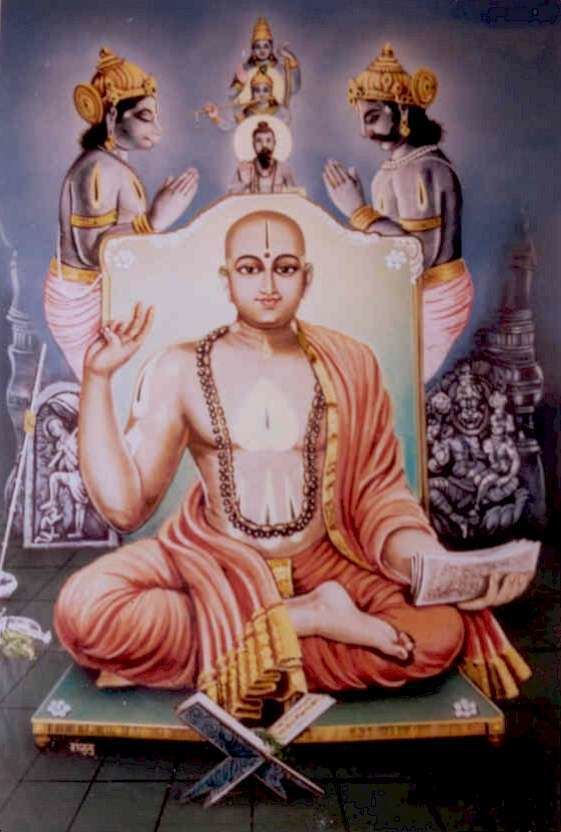Question : I recently received a transcription of the Q/A portion of a lecture you had given on the teachings Bhismadeva from Chapter 9 of Canto 1. After posting that text (below), I would like to present to you a follow-up question on this subject.
***************
From a lecture by HH Romapada Swami on ‘Srimad Bhagavatam 1.9.12-24‘ titled ‘Teaching of Bhismadeva Part 3’
Question : On the path of our devotional service, we meet obstacles in the form of our own *anarthas*. Are we to understand that those *anarthas* are arranged by Krishna, as in the category of tribulations which Bhismadeva is mentioning and which will bring us closer to Krishna? Or, are they another category in itself?
Answer by Romapada Swami :
The tribulations are the circumstantial things. Those circumstantial things or tribulations point to something that’s in our heart. It is an orchestration by Krishna to help us get right down to the real business of * anartha-nvrtti*. Usually, we see the tribulation factor as something out there – like, issues with this person, that situation, some dynamics in relationship, etc. But this is just prompting a reaction from something that is in here, within our hearts. The eradication of something that is in our heart is not going to happen by fighting with something that is out there, nor is it going to happen by trying to get rid of that something that is inside our heart on our own. It needs descending mercy.
It’s like the example Srila Prabhupada gives of a person in the bottom of the well who can’t get themselves out of the well. Only when somebody lowers a rope and pulls them out can they get out of the bottom of the well. That person is the liberated soul, and the rope is the instruction. So, when a liberated soul lowers us the rope of instruction, let’s grab onto that instruction. Then we can get out of the bottom of the well. There may be details of that instruction that have to do with the eradication of *anarthas* in our heart. Taking shelter of a spiritual master and the persons who are giving us the instructions are the means of *anartha-nvrtti*. *Anartha-nvritti* is not going to happen effectively otherwise. One may be able to follow the four regulative principles on the strength of a mode of goodness lifestyle. But to give up the more subtle things we need guidance.
For us, when tribulations come, it should be seen as an opportunity to intensify our dependency upon Krishna and also to look internally and see how we can improve ourselves. It’s not just to get out of the tribulations. We want the *anarthas* to go away.
***************
Question: How to deal with the small tribulations in dynamics with others, things which are not ‘big’ enough to bring to attention of authority and yet it is still something painful?
For example, if I am perceiving some ‘mistreatment’ by another in a small way – do I just humble myself and tolerate it, thinking it is the anartha of wanting some recognition and respect? I am okay with doing that.
But further, should I also strive to avoid such encounters or should I not alter anything and just tolerate? The case is where there isn’t a relationship where I could bring it up to that person.
Answer by Romapada Swami:
The first and foremost response of a devotee to any situation is to turn their focus towards Guru and Krishna. *sa vai manah krsna padaravindayoh* Just like Maharaja Ambarisha — when Durvasa Muni’s fiery demon attacked, Maharaja Ambarisha was not thinking about the fiery demon itself, or how to respond to Durvasa Muni, and not even about himself.
His attention went to the lotus feet of Krishna. A practiced devotee does not “react” to external circumstances. They do not *invest their consciousness* in this person or upon that situation. Their focus is internal, and more specifically, not even upon themselves but upon Krishna. This is not to say that they are disconnected from the external world, but their goal is simply to please Krishna through that situation or interaction — whether by correcting oneself and/or addressing others.
As long as the mind is agitated, it is not possible to respond transcendentally to any situation. Therefore the first business is to take the mind fixedly to Krishna’s lotus feet (or synonymously to the instructions of the Spiritual Master). By careful hearing and practicing to fix the mind on the instructions of the spiritual master, we receive transcendental intelligence how to deal with specific circumstances. In that mood of service to please Guru and Krishna, one may try to improve oneself or help others, but not as an end unto itself just to overcome the disturbing dynamics.
*THEN* the effort to reflect within and address one’s own heart should follow as a subsequent or consequent step.
Trying to address one’s anarthas without first fixing oneself on the spiritual platform will be baffling. If one thinks that by my determination, or by my philosophical understanding, I will tolerate and become humble and deal with my own heart — then one is sure to be frustrated. It is like the man who tries to get out of the well by his own efforts. This is the essential point of the “Instruction of Week” passage referred to by your question – we need to be fixed in descending mercy.
When one is practiced like this to be reflective and dependent on mercy, then one can go a further step to consider if there is something one can do to positively contribute to the situation to improve the relationship in question or uplift the consciousness of oneself and/or of the other individual. There are situations where it might be most prudent to not respond; in some cases, even a sincere attempt to extend a friendly gesture may prove highly beneficial to uplift the consciousness of both individuals.
But in all cases, our response should be based on spiritual considerations. For instance, when Duryodhana insulted Vidura, Mahatma Vidura left the palace to go on pilgrimage – not because he felt offended but because he knew this to be Krsna’s indication and that this would be best for everyone concerned. In another circumstance, Narada Muni knowingly went to meet Daksa while the latter was in a very envious attitude; Narada’s action was due to his very high degree of selfless compassion, simply to relieve Daksa of his disturbed consciousness.
There are no set formulae for dealing with the infinite variety of situations life presents, but if our focus is on pleasing Krishna, rather than trying to get out of tribulations, then we receive transcendental intelligence. Or as it is often found, the situation resolves itself mysteriously by Krishna’s mystic potency, like fog dissipating when the sun rises.
*Practice* in this way, repeatedly — in day-to-day “small” dealings, as you put it. You may not always be clear or sure, there may be some mistakes and lapses in your dealings. But by the persistent effort to try to please Guru and Krishna, and by being fixed in hearing and practicing the instructions received from Spiritual Master, one becomes adept at responding Krishna-consciously to all situations.







